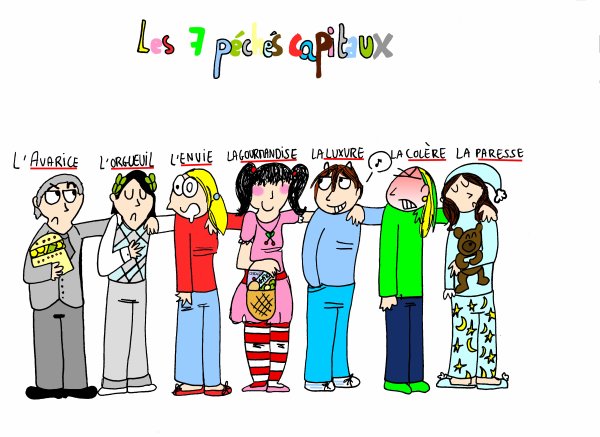LEAN is a working philosophy without waste. It allows an organization to generate maximum added value in the shortest time and at lower cost. LEAN finds its sources in the Toyota Production System. Jeffrey Liker has deciphered this model into 14 principles.
But you tell me, what relations between LEAN and the 7 Deadly Sins. Well, some behaviors are dangerous and can cause a failure in the deployment and even the sustainability of a LEAN approach. Every good leader must avoid these faults, which are deadly sins in the church, but also for deadly sins in LEAN.
[/fusion_text][/fusion_builder_column][fusion_builder_column type=”1_1″ background_position=”left top” background_color=”” border_size=”” border_color=”” border_style=”solid” spacing=”yes” background_image=”” background_repeat=”no-repeat” padding=”” margin_top=”0px” margin_bottom=”0px” class=”” id=”” animation_type=”” animation_speed=”0.3″ animation_direction=”left” hide_on_mobile=”no” center_content=”no” min_height=”none”][fusion_text]
Pride
Definition: exaggerated feeling of self worth, self esteem even excessive, bringing to get above others.
 This is the worst of deadly sins because it generates many more. The first principle (“Base your management decisions on a long-term philosophy, even at the expense of short-term financial goals“), the seventh (“Use visual control so no problems are hidden“) and the eleventh (“Respect your extended network of partners and suppliers by challenging them and helping them improve“) show that you have to install a climate of trust with yours employees. We must not hide problems we may be responsible. Finally, observe its partners working as equals with them.
This is the worst of deadly sins because it generates many more. The first principle (“Base your management decisions on a long-term philosophy, even at the expense of short-term financial goals“), the seventh (“Use visual control so no problems are hidden“) and the eleventh (“Respect your extended network of partners and suppliers by challenging them and helping them improve“) show that you have to install a climate of trust with yours employees. We must not hide problems we may be responsible. Finally, observe its partners working as equals with them.
Pride has nothing to do here! A humble responsible, sharing successes with its employees (this does not appropriate), and assumes the failures and does not assign them to employees. Unfortunately, this is not always the case. Those who suffer from the sin of pride and are a hindrance to deployment of a LEAN approach. The proud responsible is “Personnaly , I ….”
Greed
Definition: Attitude, character of someone restricted to excess spending. Excessive attachment to money.
 In business, maybe looking for a sterile accumulation. Among others, the first principle (“Base your management decisions on a long-term philosophy, even at the expense of short-term financial goals“), the tenth (“Develop exceptional people and teams who follow your company’s philosophy“), and the eleventh (“Respect your extended network of partners and suppliers by challenging them and helping them improve“) suggest a distrust against greed. We must plan for the long term through investments, training its employees, working with partners. We must not seek short-term profit, but work on the long term.
In business, maybe looking for a sterile accumulation. Among others, the first principle (“Base your management decisions on a long-term philosophy, even at the expense of short-term financial goals“), the tenth (“Develop exceptional people and teams who follow your company’s philosophy“), and the eleventh (“Respect your extended network of partners and suppliers by challenging them and helping them improve“) suggest a distrust against greed. We must plan for the long term through investments, training its employees, working with partners. We must not seek short-term profit, but work on the long term.
Misers are dangerous for the company. Note that I do not say that we should not spenders: We need leaders who make expenditures for the company and especially spending for future investment and thinking men training. The misers responsible is “Training is expensive …”
Envy
Definition: Lust mixed or not legal or hatred, for the happiness or someone benefits. Jealousy.
 The company is not to be jealous of its competitors such as the manager or the employee should not be jealous of his colleagues. The fifth principle (“Build a culture of stopping to fix problems, to get quality right the first time“), the sixth (“tandardized tasks and processes are the foundation for continuous improvement and employee empowerment“) and the eight (“Use only reliable, thoroughly tested technology that serves your people and processes“) suggest the following: do not be jealous of another who finds an answer to my problem, do not hesitate to share my best practices within the company, even if others will apply can be better than me, and also, do not systematically seek to have the same equipment as my competitor, for I am not yet be ready to use.
The company is not to be jealous of its competitors such as the manager or the employee should not be jealous of his colleagues. The fifth principle (“Build a culture of stopping to fix problems, to get quality right the first time“), the sixth (“tandardized tasks and processes are the foundation for continuous improvement and employee empowerment“) and the eight (“Use only reliable, thoroughly tested technology that serves your people and processes“) suggest the following: do not be jealous of another who finds an answer to my problem, do not hesitate to share my best practices within the company, even if others will apply can be better than me, and also, do not systematically seek to have the same equipment as my competitor, for I am not yet be ready to use.
The envious are not useful to the company. For, instead of acting, they are jealous. Be carrreful, envy, under another definition is very important and even compulsory: want to progress, want to become the best in the best sense. What is dangerous is envy in the sense of jealousy. The envious responsible is “Yes, but he has …”
Wrath
Definition: Violent emotional state and transient resulting feelings of aggression, an annoyance, reflecting strong dissatisfaction and accompanied by backlash.
 Wrath is dangerous, because among other things, it hurts the people who are targeted. To comment on this deadly sin, I’ll refer to the 3 last principles. The twelfth (“Go and see for yourself to thoroughly understand the situation“), the thirteenth ( “Make decisions slowly by consensus, thoroughly considering all options; implement decisions rapidly“) and fourteenth (“Become a learning organization through relentless reflection and continuous improvement“). There is no point getting angry, we must first understand, going on the workshop, discussing and involving everyone. To err is human, problem solving and continuous improvement are a teamwork.
Wrath is dangerous, because among other things, it hurts the people who are targeted. To comment on this deadly sin, I’ll refer to the 3 last principles. The twelfth (“Go and see for yourself to thoroughly understand the situation“), the thirteenth ( “Make decisions slowly by consensus, thoroughly considering all options; implement decisions rapidly“) and fourteenth (“Become a learning organization through relentless reflection and continuous improvement“). There is no point getting angry, we must first understand, going on the workshop, discussing and involving everyone. To err is human, problem solving and continuous improvement are a teamwork.
The choleric is dangerous, because it scares employees and prevents decision making and therefore any continuous improvement philosophy. The wrath resposnible is “I’ve always said …”
Lust
Definition: Search pleasures. Exuberance.
 I would take here lust in the sense of enjoying seeing only things that go well. And I will make reference to the second principle (“Create a continuous process flow to bring problems to the surface“), the third (“Use “pull” systems to avoid overproduction“) and the seventh (“Use visual control so no problems are hidden“). In rejecting these principles, we may be required to hide our problems, or to overproduce pushing production on a machine to believe the best, regardless of the exact needs. It is the discovery of problems that allows us to move forward. Similarly, it must resonate in all positions to improve the entire company.
I would take here lust in the sense of enjoying seeing only things that go well. And I will make reference to the second principle (“Create a continuous process flow to bring problems to the surface“), the third (“Use “pull” systems to avoid overproduction“) and the seventh (“Use visual control so no problems are hidden“). In rejecting these principles, we may be required to hide our problems, or to overproduce pushing production on a machine to believe the best, regardless of the exact needs. It is the discovery of problems that allows us to move forward. Similarly, it must resonate in all positions to improve the entire company.
Responsible follower of this lust, will be required to use dashboards that fixes it, or hide penalizing figures. The lust responsible is “Yes, but this KPI is very good …”
Sloth
Definition: Behavior someone repugnant to the effort, work, activity. Taste for idleness.
 Sloth will among others help us to improve and evolve. The sixth principle (“Standardized tasks and processes are the foundation for continuous improvement and employee empowerment“), the twelth (“Go and see for yourself to thoroughly understand the situation“), and the thirteenth (“Make decisions slowly by consensus, thoroughly considering all options; implement decisions rapidly“) show us that many tasks are needed. Set up standard require work that is useful for the future. Go to the field requires to be involved in all activities. Finally, decide unanimously, after reflection, avoid taking fast but often curative and not preventive decisions, but requires the will.
Sloth will among others help us to improve and evolve. The sixth principle (“Standardized tasks and processes are the foundation for continuous improvement and employee empowerment“), the twelth (“Go and see for yourself to thoroughly understand the situation“), and the thirteenth (“Make decisions slowly by consensus, thoroughly considering all options; implement decisions rapidly“) show us that many tasks are needed. Set up standard require work that is useful for the future. Go to the field requires to be involved in all activities. Finally, decide unanimously, after reflection, avoid taking fast but often curative and not preventive decisions, but requires the will.
The sloth responsible is the one who remains in his office, and usually only reads dashboards, and without understanding the workshop. The sloth responsible is “I do not have time, I expect an important phone call …”
Gluttony
Definition: to want something without having to.
 Gluttony, is to be envied and acquire unnecessary material. It’s to do not use available resources over other resources easier. The eighth principle (“Use only reliable, thoroughly tested technology that serves your people and processes“), the ninth (“Grow leaders who thoroughly understand the work, live the philosophy, and teach it to others“) and the eleventh (“RRespect your extended network of partners and suppliers by challenging them and helping them improve“) can make us understand the risks of gluttony. It is indeed dangerous to invest in a hardware “top”, for fun. It is also long-term hazardous to favor external recruitment in favor of an internal person with capacity but for which training is required. Finally, it is often easier but riskier long-term focus of a new cheaper supplier from the usual supplier with whom we partner.
Gluttony, is to be envied and acquire unnecessary material. It’s to do not use available resources over other resources easier. The eighth principle (“Use only reliable, thoroughly tested technology that serves your people and processes“), the ninth (“Grow leaders who thoroughly understand the work, live the philosophy, and teach it to others“) and the eleventh (“RRespect your extended network of partners and suppliers by challenging them and helping them improve“) can make us understand the risks of gluttony. It is indeed dangerous to invest in a hardware “top”, for fun. It is also long-term hazardous to favor external recruitment in favor of an internal person with capacity but for which training is required. Finally, it is often easier but riskier long-term focus of a new cheaper supplier from the usual supplier with whom we partner.
The glutton responsible, invests in new technologies without validating and, for fun. He prefers to recruit externally, even demotivate internal staff. The glutton responsible is “I just invest in the best of the best …”
Are you one of those responsible ?


